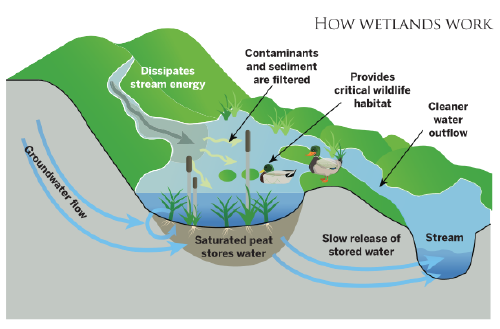Protecting natural assets a vital task in nation
The 14th Meeting of the Conference of the Contracting Parties to the Ramsar Convention on Wetlands, also known as COP14, opens on Saturday in Wuhan, capital city of Central China's Hubei province.
Running until Nov 13, the meeting features both online and offline events and has set up a branch venue in Geneva, Switzerland, where the convention's secretariat is located. This is the first time the meeting is held in China, which became the treaty's 67th contracting party in 1992.
The Convention on Wetlands is an intergovernmental agreement that provides the framework for the conservation and wise use of wetlands and their resources through local and national actions and international cooperation. So far it has 172 contracting parties.
Since its accession to the Convention on Wetlands 30 years ago, China has always adhered to the concept of ecological civilization and green development.
The Chinese government has been deeply engaged in the implementation of the convention and has conducted extensive international cooperation and exchanges.
China has been carrying out the designation of wetland sites as "Wetlands of International Importance". To date, it is home to 64 Wetlands of International Importance and 13 International Wetland Cities, both accredited by the convention.
The Chinese government was unanimously elected as a member of the Standing Committee of the Convention on Wetlands at the COP9 in 2005. That year, China launched the pilot sites of national wetland parks and hosted the Asian Regional Conference of the Convention on Wetlands in Beijing.
China submitted the draft resolution on conservation and management of small and micro wetlands, which was adopted at the COP13 in 2018, and won the bid in 2019 to host the COP14.
The National Forestry and Grassland Administration began to release the white paper titled the Ecological Condition of China's Wetlands of International Importance (Ramsar Sites) in 2019.
The country has played an active role in bilateral and multilateral international cooperation projects including the Global Environment Facility projects, contributing Chinese wisdom and solutions to global ecological governance.
One of China's latest environmental moves is the adoption of the Wetland Protection Law, which came into force on June 1.
"China's legal framework for wetland protection is getting perfected in recent years," Zhang Mingxiang, vice-dean of the School of Ecology and Nature Conservation of Beijing Forestry University, told the China Development Observation magazine.
As one of the experts who participated in the formulation of the Wetland Protection Law, Zhang said the law demonstrates to the world that China attaches great importance to wetland protection and has made remarkable progress as a responsible member of the international community.
The Wetland Protection Law clarifies the duties of relevant government bodies in wetland protection and has put in place mechanisms for collaboration among different departments.
The severity of the penalties set out in the law, for damage to and illegal appropriation of wetlands, is unprecedented, which is aimed at deterring potential of enders, Zhang said.












